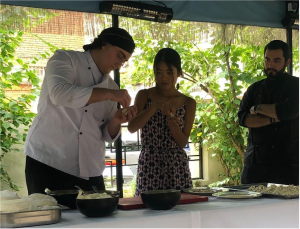
My name is Yueun Kang, and I am currently studying abroad in Tbilisi, Georgia through the Critical Language Scholarship funded by the U.S. Department of State. With the guidance of professors in the UNC Russian Flagship Program, I have been fortunate to receive this scholarship that covers the cost of the program as well as all airfare, housing, and food.
Due to COVID, all CLS scholars are staying in a hotel rather than with host families which is typically a part of the program. There’s a beautiful park 10 minutes away from the hotel, and that’s where I am writing this article now.
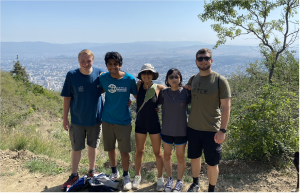
I will walk you through what my weekly schedule looks like! I usually wake up at 6:15 AM. I run or hike with other scholars before class starts.
After our morning exercise, we eat breakfast together at 7:30 AM in the hotel. At 8:30 AM, I walk 15 minutes to my class at Ilia State University. From 9 AM to 12 PM we have grammar classes with a 10-minute break every 50 minutes. From 12-1pm, we all eat lunch at a nearby restaurant followed by our conversation class that lasts another hour with a different professor.
After class, my schedule varies depending on the day. On Monday, the cohort has a check-in meeting with the director of the program.
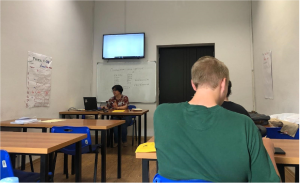
For example, on Tuesdays, I have 1-2 hours of conversational meet-up with my language partner. Every scholar is assigned a local language partner to meet with 3 hours a week. Sofia is my language partner, and we meet twice a week! Sofa was born and raised in Tbilisi and is a 24-year-old graphic designer. She is kind and patient with me and occasionally gives me a “teacher look” when I cannot remember a word she said 10 seconds ago. Memorizing new words is challenging! I tell her this every time — she then smiles and tells me the word. But I don’t get too comfy because I know she will ask me to repeat the word again 5 minutes after teaching me a dozen other new words.
We can choose to do whatever we want with our language partners! The only requirement is speaking Russian and improving our language skills.For example, last week I went to a Korean restaurant with her and other scholars because Sofa had never tried Asian cuisine!
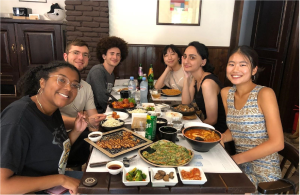
She fell in love with “kimchi” (a traditional Korean dish), which made me quite ecstatic. Speaking of food, myy favorite dish here is khinkali, which are Georgian soup dumplings. My favorite snacks is Matsoni, a dish made from fermented milk similar to keifer. Occasionally I also indulge in Georgian sweets, but I have been pleasantly surprised by how many Korean snacks I have found in Georgian supermarkets!
On Wednesdays, I have a 1-hour Georgian class. In Georgia, the official language is not Russian! It is Georgian. And that is why it is sometimes challenging to practice Russian in the real world. People prefer that I speak English instead of Russian due to the political situation. However, many people, especially those living in the capital, understand and speak Russian. It is taught as a second language alongside English and German. I learned from a lecture that Georgians think of Russian as a “familiar language” while English as a “high-class” or “educated” language. In Georgian class, we learn basic phrases like “hello — gamarjoba,” thank you — madloba,” and study the alphabet (ანბანები), which looks like beautiful squiggly lines to me.
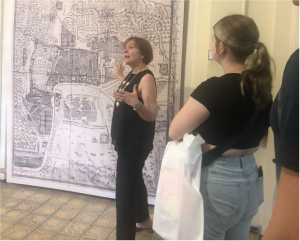
On Thursdays, we have museum excursions. If I am being honest, I don’t understand much from our Russian tours because the guide speaks quite quickly about historical or political topics. But I know that this is part of the language learning journey. Instead of being frustrated, I just calmly listen. I know that the more I listen and the more I speak my language skills will secretly improve and do its magic while I get my daily dose of 8 hours of sleep.
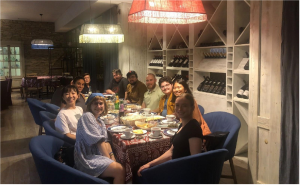
On Fridays, I typically meet with Sofa again and invite other students along. I like introducing her to my friends in the program and making her feel like my friend and not my tutor. On weekends, we either go on a planned excursion or have other related cultural activities to learn more about Georgian history, culture, and food.
On Sundays, I call my parents and let them know that I am alive and showcase my awful Korean. Let me explain: I feel like I am “losing” the languages I already know because I am constantly thinking in Russian. When I try to think of an English word, my brain naturally reverts to Russian emergency mode, and it takes a few seconds to switch to a different language. I calm my brain by saying to myself— “relax. You can think in English.” Yesterday, I made 3 English grammar and vocabulary mistakes. I felt better when I heard another scholar say “I like eating sparkling water.”
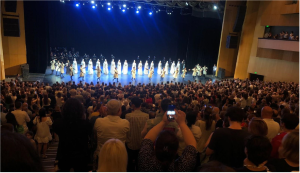
My days here are packed with exciting events left and right. However, I don’t want to paint an all-happy picture. It is challenging studying a language and living in a foreign place. When I am studying language, the fundamental building block for communication with the world, every moment is a learning experience. After 4 hours of classes, I am tired, so when I have a free day, I take the time off for myself and rest.
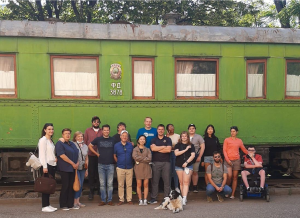
I have newfound respect for babies who are learning how to communicate with their parents – “I don’t like banana puree!! Why don’t you understand!?” I used to think they have it easy, but now, I have great respect for all of the babies out there. I am a Russian baby and feel helpless when my teacher asks me something and doesn’t recognize any words in the question. Then I politely ask: “Извините. Я не понимаю. Вы можете повторить вопрос, пожалуйста?”
Yueun Kang is a senior at UNC-Chapel Hill pursuing Economics and Videojournalism majors. As a scholar of the CLS program by the US Department of State, she participated in an intensive language program in Tbilisi, Georgia summer of 2022. Additionally, she represented the UNC Flagship program at the UCLA Conference on Slavic & East-Central European Studies presenting her independent studies: Russian Stoicism – Toward a Critical Perspective.
